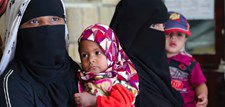Scaling up nutrition services and maintaining service during conflict in Yemen: Lessons from the Hodeidah sub-national Nutrition Cluster
An ENN article by Dr. Saja Abdullah, Dr. Rasha Al Ardi, and Dr. Rajia Sharhan. What we know: Yemen is the poorest Arab nation, embroiled in lengthy political crisis and ongoing conflict. Malnutrition is a major and chronic problem; international humanitarian access is compromised. What…
 An ENN article by Dr. Saja Abdullah, Dr. Rasha Al Ardi, and Dr. Rajia Sharhan.
An ENN article by Dr. Saja Abdullah, Dr. Rasha Al Ardi, and Dr. Rajia Sharhan.
What we know: Yemen is the poorest Arab nation, embroiled in lengthy political crisis and ongoing conflict. Malnutrition is a major and chronic problem; international humanitarian access is compromised.
What this article adds: The Nutrition Cluster was established in the Yemen in 2009, co-led by the Ministry of Public Health and Population and UNICEF. There are five sub-national clusters. Through 2012-14, scale up of nutrition services (SAM and MAM treatment, IYCF, micronutrient supplementation, strengthened reporting), combined with multi-sectoral interventions led to an improved nutrition situation in Hodeidah governate. The majority of programming has been government led; local NGOs have been an integral part of the provision of health and nutrition service delivery. Ongoing challenges include poor integration of SAM/MAM services, failure to address prevalent stunting, funding gaps and escalating conflict compromising service delivery and access further. The SUN Movement multi-sector plan, finalised and pending implementation, offers an opportunity to connect emergency and development programming.
Country overview
Yemen is the poorest Arab nation, characterised by high unemployment (40%, geopoliticalmonitor.com), rapid population growth (45% of the population are below the age of 15) and diminishing water resources. The economy, heavily dependent on dwindling oil supplies (expected to end by 2017), has been severely disrupted by a lengthy political crisis and conflicts on several fronts spanning a number of years. Fighting escalated in March 2015, exacerbating an already severe humanitarian crisis with large scale population displacement, destroyed civilan structures, including hospitals and schools, and near collapse of basic services. There are widespread fuel shortages (reduing export earnings) and extremely limited access to water in many areas.
Health, nutrition and food security
An estimated 8.4 million people lack access to basic healthcare and maternal mortality is high. An estimated 13.4 million people lack access to safe drinking water and 12 million people have no proper sanitation facilities (UN OCHA, 2015). Malnutrition is a major and chronic problem in Yemen. Stunting is prevalent (47% in 2011; IFPRI, 2014); acute malnutrition is estimated nationally at 16% (DHS 2014), although there are areas where this is significantly higher. Yemen suffers from the double burden of malnutrition; 46% of adults are overweight and 17% are obese (WHO, 2008). Anaemia affects 38% of women of reproductive age and 27% of school-aged children are vitamin A deficient (IFPRI, 2014). While breastfeeding is common in Yemen (97% of all women breastfed), infant and young child feeding (IYCF) practices are characterised by low timely breastfeeding initiation rates (40%) (MICS, 2006), very low exclusive breastfeeding rates (12%) (UNICEF 2003), and a high level use of feeding bottles (42% use in 0-3 months, Yemen Family Health Survey, 2003).
Nearly half (46%) of the population (12 million people) are food insecure (WFP Sit Rep #8, 28 May 2015). Almost all food (90%) is imported and prices have increased due to disruption in food supply routes and sporadic transportation services. Meanwhile, household incomes have decreased due to the devaluation of the local currency.
Continue reading this article at ENN Field Exchange
Download this article as a PDF
Learn more about Scaling Up Nutrition in Yemen
The Emergency Nutrition Network (ENN) and support to the SUN Movement
ENN is a UK registered charity which was set up to improve practice and strengthen the institutional memory of agencies involved in the emergency food and nutrition sectors. ENN focuses on communities in crisis, typically humanitarian emergencies. ENN enables nutrition networking and learning to build the evidence base for nutrition programming in three ways:
- Field Exchange (FEX), an online and print publication on nutrition and food security in emergencies and high burden contexts. Field Exchange is printed three times per year.
- Nutrition Exchange (NEX), is an online publication of short, easy to read articles on nutrition programme experiences and learning. Nutrition is summarised information from the flagship publication, Field Exchange.
- en-net, a free and open resource that helps practitioners access technical advice for operational challenges through the online forum. A specific area for SUN en-net was launched in 2015. Visit SUN en-net ►
ENN is part of the DFID funded Technical Assistance for Nutrition (TAN) programme under which ENN is providing knowledge management services to the SUN Movement in Phase Two (2016-2020). ENN is focused on capturing, curating and disseminating knowledge and learning about nutrition scale up with a focus on high burden and fragile and conflict affected states. Three regional specialists and a Knowledge Management Coordinator are working with country level SUN actors (government, UN, donors, civil society, business and academia) to capture what is being learnt about the scale up of nutrition specific and sensitive activities.